- Home
- Harlan Coben
Gone for Good (2002) Page 11
Gone for Good (2002) Read online
Page 11
"You want to tell me what happened yesterday?" he began.
"I don't know what you mean."
"You and your sister." Dad pulled out a two-liter bottle of Diet Coke.
"What was that all about?"
"Nothing," I said.
He nodded as he opened a cabinet. He took out two glasses, opened the freezer, filled them with ice. "Your mother used to eavesdrop on you and Melissa," he said.
"I know."
He smiled. "She wasn't very discreet. I'd tell her to cut it out, but she'd just tell me to hush, it was a mother's job."
"You said, me and Melissa."
"Yes."
"Why not Ken?"
"Maybe she didn't want to know." He poured the sodas. "Very curious about your brother lately."
"It's a natural enough question."
"Sure, natural. And after the funeral, you were asking me if I think he's still alive. And then the next day, you and Melissa have an argument about him. So I'll ask you one more time: What's going on?"
The photograph was still in my pocket. Don't ask me why. I'd made color copies with my scanner that morning. But I couldn't let go of it.
When the doorbell rang, we both jumped, startled. We looked at each other. Dad shrugged. I told him I'd get it. I took a quick sip of the Diet Coke and put it back on the counter. I trotted to the front door. When I opened it, when I saw who it was, I nearly toppled back.
Mrs. Miller. Julie's mom.
She held out a platter wrapped with aluminum foil. Her eyes were lowered as though she were making an offering on an altar. For a moment, I froze, unsure what to say. She glanced up. Our eyes met just as they had when I stood on her curb two days earlier. The pain I saw in them felt alive, electric. I wondered if she felt the same coming from mine.
"I just thought ..." she began. "I mean, I just ..."
"Please," I said. "Come in."
She tried to smile. "Thank you."
My father moved from the kitchen and said, "Who's there?"
I backed up. Mrs. Miller stepped into view, still holding up the platter as if for protection. My father's eyes widened, and I saw something behind them burst.
His voice was a rage-filled whisper. "What the hell are you doing here?"
"Dad," I said.
He ignored me. "I asked you a question, Lucille. What the hell do you want?"
Mrs. Miller lowered her head.
"Dad," I said more urgently.
But it was no use. His eyes had gone small and black. "I don't want you here," he said.
"Dad, she came to offer "
"Get out."
"Dad!"
Mrs. Miller shrunk back. She pushed the platter into my hands. "I better go, Will."
"No," I said. "Don't."
"I shouldn't have come."
Dad shouted, "Damn right you shouldn't have come."
I shot him a glare, but his eyes stayed on her.
With her eyes still lowered, Mrs. Miller said, "I'm sorry for your loss."
But my father was not through. "She's dead, Lucille. It doesn't do any good now."
Mrs. Miller fled then. I stood holding the platter. I looked at my father in disbelief. He looked back and said, "Throw that crap away."
I was not sure what to do here. I wanted to follow her, to apologize, but she was halfway up the block and moving fast. My father had moved back into the kitchen. I followed, slamming the platter down on the counter.
"What the hell was that about?" I asked.
He picked up his drink. "I don't want her here."
"She came to pay her respects."
"She came to ease her guilt."
"What are you talking about?"
"Your mother is dead. There's nothing she can do for her now."
"That doesn't make any sense."
"Your mother called Lucille. Did you know that? Not long after the murder. She wanted to offer her condolences. Lucille told her to go to hell. She blamed us for raising a murderer. That's what she said.
It was our fault. We raised a murderer."
"That was eleven years ago, Dad."
"Do you have any idea what that did to your mother?"
"Her daughter had just been murdered. She was in a lot of pain."
"So she waits until now to make it right? When it won't-do any good?"
He shook his head sternly. "I don't want to hear it. And your mother, well, she can't."
The front door opened then. Aunt Selma and Uncle Murray entered with their grieving smiles in place. Selma took over the kitchen. Murray busied himself with a loose wall plate he'd spotted yesterday.
And my father and I stopped talking.
Chapter Seventeen.
Special Agent Claudia Fisher stiffened her spine and knocked on the door.
"Come in."
She turned the knob and entered the office of Assistant Director in Charge Joseph Pistillo. The ADIC immaturely nicknamed, naturally enough, a-dick ran the New York office. Outside of the director in Washington, an ADIC was the most senior and powerful agent in the FBI.
Pistillo looked up. He did not like what he saw. "What?"
"Sheila Rogers was found dead," Fisher reported.
Pistillo cursed. "How?"
"She was found on a roadside in Nebraska. No ID. They ran her prints through NCIC and got a hit."
"Damn."
Pistillo chewed on a cuticle. Claudia Fisher waited.
"I want a visual confirmation," he said.
"Done."
"What?"
"I took the liberty of em ailing Sheriff Farrow the mug shots of Sheila Rogers. She and the M. E. confirmed it was the same woman. The height and weight match too."
Pistillo leaned back. He grabbed a pen, raised it to eye level, and studied it. Fisher stood at attention. He signaled for her to sit.
She obeyed. "Sheila Rogers's parents live in Utah, right?"
"Idaho."
"Whatever. We need to contact them." izo "I have the local police on standby. The chief knows the family personally."
Pistillo nodded. "Okay, good." He took the pen out of his mouth. "How was she killed?"
"Probably internal bleeding from a beating. The autopsy is still under way."
"Jesus."
"She was tortured. Her fingers had been snapped back and twisted, probably by a pair of pliers. There were cigarette burns on her torso."
"How long has she been dead?"
"She probably died sometime last night or early in the morning."
Pistillo looked at Fisher. He remembered how Will Klein, the lover, had sat in that very chair yesterday. "Fast," he said.
"Excuse me?"
"If, as we were led to believe, she ran away, they found her fast."
"Unless," Fisher said, "she ran to them."
Pistillo leaned back. "Or she never ran at all."
"I'm not following."
He studied the pen some more. "Our assumption has always been that Sheila Rogers fled because of her connection to the Albuquerque murders, right?"
Fisher tilted her head back and forth. "Yes and no. I mean, why come back to New York just to run away again?"
"Maybe she wanted to go to the mother's funeral, I don't know," he said. "Either way, I don't think that's the case anymore. Maybe she never knew we were on to her. Maybe stay with me here, Claudia maybe someone kidnapped her."
"How would that have worked?" Fisher asked.
Pistillo put down the pen. "According to Will Klein, she left the apartment at, what, six in the morning?"
"Five."
"Fine, five. So let's put this together using the accepted scenario.
Sheila Rogers walks out at five. She goes into hiding. Someone finds her and tortures her and dumps her in the boonies of Nebraska. That sound about right?"
Fisher nodded slowly. "Like you said, fast."
"Too fast?"
"Maybe."
"Time-phase-wise," Pistillo said, "it's far more likely that someone grabbed her rig
ht away. As soon as she left the apartment."
"And flew her to Nebraska?"
"Or drove like a demon."
"Or .. . ?" Fisher began.
"Or?"
She looked at her boss. "I think," she said, "that we're both coming to the same conclusion. The time line is too close. She probably disappeared the night before."
"Which means?"
"Which means that Will Klein lied to us."
Pistillo grinned. "Exactly."
Fisher's words started coming fast now. "Okay, here's a more likely scenario: Will Klein and Sheila Rogers go to the funeral of Klein's mother. They return to his parents' house afterward. According to Klein, they drive back to their apartment that night. But we have no independent confirmation of that. So maybe" she tried to slow down but that wasn't happening "maybe they don't head home. Maybe he hands her over to an accomplice, who tortures and kills her and dumps the body.
Will meanwhile drives back to his apartment. He goes to work in the morning. When Wilcox and I brace him at his office, he makes up this story about her leaving in the morning."
Pistillo nodded. "Interesting theory."
She stood at attention.
"Do you have a motive?" he asked.
"He needed to silence her."
"For?"
"Whatever happened in Albuquerque."
They both mulled it over in silence.
"I'm not convinced," Pistillo said.
"Neither am I."
"But we agree that Will Klein knows more than he's saying."
"For certain."
Pistillo let loose a long breath. "Either way, we need to give him the bad news about Ms. Rogers's demise."
"Yes."
"Call that local chief out in Utah."
"Idaho."
"Whatever. Have him inform the family. Then get them on a plane for official identification."
"What about Will Klein?"
Pistillo thought about that. "I'll reach out to Squares. Maybe he can help us deliver the blow."
Chapter Eighteen.
My apartment door was ajar.
After Aunt Selma and Uncle Murray's arrival, my father and I carefully avoided each other. I love my father. I think I have made that pretty clear. But a small part of me irrationally blames him for my mother's death. I don't know why I feel that way, and it is very hard to admit this even to myself, but from the moment she first became ill, I looked at him differently. As though he hadn't done enough. Or perhaps I blamed him for not saving her after Julie Miller's murder. He hadn't been strong enough. He hadn't been a good enough husband. Couldn't true love have helped Mom recover, salved her spirit?
Like I said, irrational.
My door was only open a crack, but it made me pause. I always lock it hey, I live in a doorman-free building in Manhattan but then again I had not been thinking straight of late. Perhaps in my haste to meet Katy Miller I'd just forgotten. That would be natural enough. And the dead bolt gets stuck sometimes. Maybe I'd never fully closed the door in the first place.
I frowned. Not likely.
I put my hand on a door panel and pushed ever so slightly. I waited to hear the door creak. It did not. I heard something. Faint at first.
I leaned my head through the opening and immediately felt my insides turn to ice Nothing I saw was out of the ordinary. The lights were out, as a matter of fact. The blinds were drawn, so there was not much illumination. No, nothing out of the ordinary or again, nothing that I could see. I stayed in the corridor and leaned in a little more.
But I could hear music.
Again, that alone would not cause too much alarm. I do not make it a practice to leave music playing like some security-conscious New Yorkers, but I confess to a major streak of absentmindedness. I could have left my CD player on. That alone would not chill me like this.
What did chill me, however, was the song selection.
That was what was getting to me. The song playing I tried to remember when I last heard it was "Don't Fear the Reaper." I shuddered.
Ken's favorite song.
By Blue Oyster Cult, a heavy metal band, though this song, their most famous, was more subdued, almost ethereal. Ken used to grab his tennis racket and fake-guitar the solos. And I know that I do not have a copy of that particular song on any of my CDs. No way, unh-unh. Too many memories.
What the hell was going on here?
I stepped into the room. As I said before, the lights were out. It was dark. I stopped and felt awfully stupid. Hmm. Why not just flick on the lights, numb nuts Wouldn't that be a good idea?
As I reached for the switch, another inner voice said, Better yet, why not just run? That was what we always yell at the movie screens, right? The killer is hiding inside the house. The stupid teenager, after finding her best friend's decapitated corpse, decides that this would be the perfect time to stroll through the darkened house instead of, say, fleeing and screaming like a mad animal.
Gee, all I had to do was strip down to a bra and I could be playing the part.
The song faded down in a guitar solo. I waited for the silence. It was brief. The song started up again. The same song.
What the hell was going on?
Flee and scream. That was the ticket. I would do just that. Except for one thing. I had not stumbled across any headless corpse. So how would this play out here? What exactly would I do? Call the police? I could just see that. What seems to be the problem, sir? Well, my stereo is playing my brother's favorite song so I decided to start running down the hall screaming. Can you rush over here with guns drawn? Uh-huh, sure, we're on our way.
How dorky would that sound?
And even if I assumed that someone had broken in, that there was indeed a prowler still in my apartment, someone who had brought his own CD with him .. . . well, who was that most likely to be?
My heart picked up a beat as my eyes began to adjust to the dark. I decided to leave the lights off. If there was an intruder, there was no reason to let him know I was standing there, an easy target. Or would turning on the light scare him into view?
Christ, I'm not good at this.
I decided to leave the lights off.
Okay, fine, let's play it that way. Lights stay off. Now what?
The music. Follow the music. It was coming from my bedroom. I turned in that direction. The door was closed. I stepped toward it.
Carefully. I was not going to be a total idiot. I opened the front door all the way and left it like that in case I had to scream or make a run for it.
I moved forward in a sort of spastic slide, leading with the left foot but keeping the right toes firmly pointed toward the exit. It reminded me of one of Squares's yoga stances. You spread your legs and you bend one way but both your weight and your "awareness" go in the opposite direction. The body moves one way, the mind another. This was what some yogis, not Squares thankfully, referred to as "spreading your consciousness."
I slid a yard. Then another. Blue Oyster Cult's Buck Dharma the fact that I remembered not only that name, but that his real name was Donald Roeser said a lot about my childhood sang how we can be like they are, like Romeo and Juliet.
In a word: dead.
I reached the bedroom door. I swallowed and pushed against the frame.
No go. I'd have to turn the knob. My hand gripped the metal. I looked over my shoulder. The door was still wide open. My right foot stayed pointed in that direction, though I could no longer be sure of my "awareness." I turned the knob as silently as possible, but it still sounded like a gunshot in my ear.
I pushed just a little, just to clear the frame. I let go of the knob.
The music was louder now. Crisp and clear. Probably playing on the Bose CD player Squares had gotten me for my birthday two years ago.
I stuck my head in, just for a quick look. And that was when someone grabbed me by the hair.
I barely had time to gasp. My head was tugged forward so hard, my feet left the ground. I flew across the room, my hands
stretched out Superman style, and landed in a thudding belly flop.
The air left my lungs with a whoosh. I tried to roll over, but he assumed it was a he was already on top of me. His legs straddled my back. An arm snaked around my throat. I tried to struggle, but his grip was impossibly strong. He pulled back and I gagged.
I couldn't move. Totally at his mercy, he lowered his head toward mine. I could feel his breath in my ear. He did something with his other arm, got a better angle or counterweight, and squeezed. My windpipe was being crushed.
My eyes bulged. I pawed at my throat. Useless. My fingernails tried to dig into his forearm, but it was like trying to penetrate mahogany.
The pressure in my head was building, growing unbearable. I flailed.
My attacker did not budge. My skull felt like it was about to explode.
And then I heard the voice:
"Hey'Willieboy."
That voice.
I placed it instantly. I had not heard it in Christ, I tried to remember ten, fifteen years maybe? Since Julie's death anyway. But there are certain sounds, voices mostly, that get stored in a special section of the cortex, on the survival shelf if you will, and as soon as you hear them, your every fiber tenses, sensing danger.
He let go of my neck suddenly and completely. I collapsed to the floor, thrashing, gagging, trying to dislodge something imaginary from my throat. He rolled off me and laughed. "You've gone soft on me, Willie boy."
I flipped over and scooted away in a back crawl. My eyes confirmed what my ears had already told me. I could not believe it. He had changed, but there was no mistake.
"John?" I said. "John Asselta?"
He smiled that smile that touched nothing. I felt myself drop back in time. The fear the fear I hadn't experienced since adolescence surfaced. The Ghost that was what everyone called him, though no one had the courage to say it to his face had always had that effect on me.
I don't think I was alone in that. He terrified pretty much everyone, though I had always been protected. I was Ken Klein's little brother.
For the Ghost, that was enough.
I have always been a wimp. I have shied away from physical confrontations all my life. Some claim that makes me prudent and mature. But that was not it. The truth is, I am a coward. I am deathly afraid of violence. That might be normal survival instinct and all but it still shames me. My brother, who was, strangely enough, the Ghost's closest friend, had the enviable aggression that separated the wannabes from the greats. His tennis, for example, reminded some of a young John McEnroe in that take-on-the-world, pit-bull, won't-lose, borderline going-too-far competitiveness. Even as a child, he'd battle you to the death and then stomp on the remains after you fell. I was never like that.

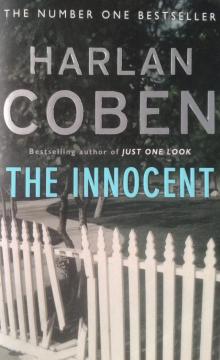 The Innocent
The Innocent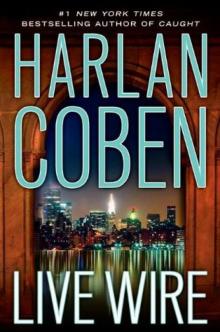 Live Wire
Live Wire Play Dead
Play Dead Drop Shot
Drop Shot Seconds Away
Seconds Away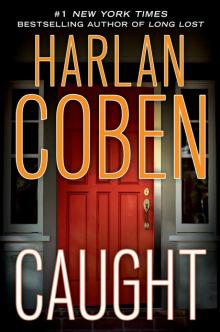 Caught
Caught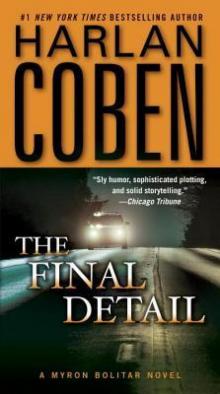 The Final Detail
The Final Detail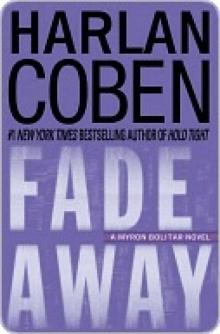 Fade Away
Fade Away Home
Home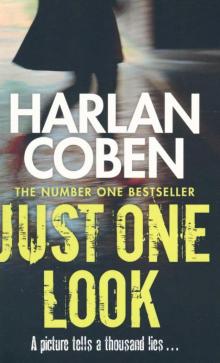 Just One Look
Just One Look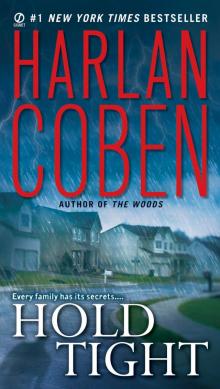 Hold Tight
Hold Tight Fool Me Once
Fool Me Once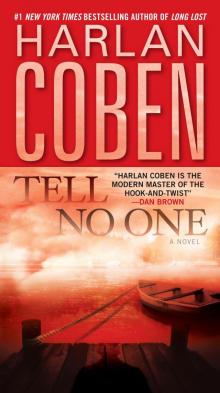 Tell No One
Tell No One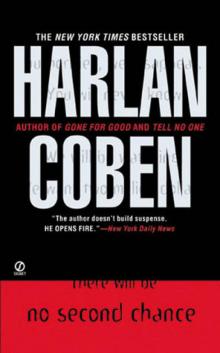 No Second Chance
No Second Chance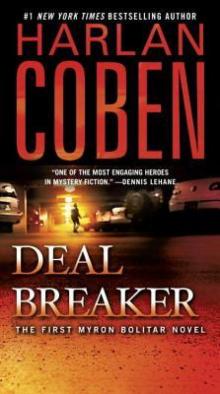 Deal Breaker
Deal Breaker Long Lost
Long Lost One False Move
One False Move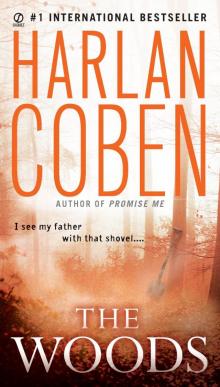 The Woods
The Woods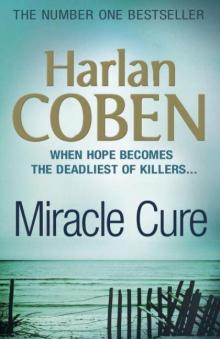 Miracle Cure
Miracle Cure Found
Found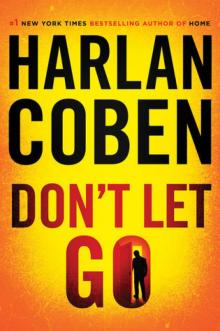 Don't Let Go
Don't Let Go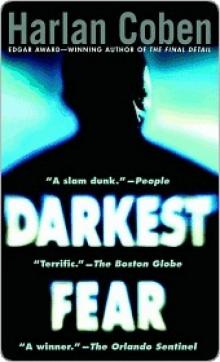 Darkest Fear
Darkest Fear The Stranger
The Stranger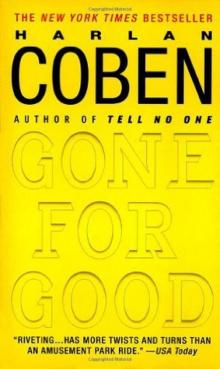 Gone for Good
Gone for Good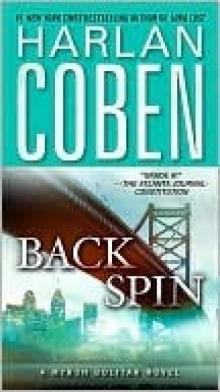 Back Spin
Back Spin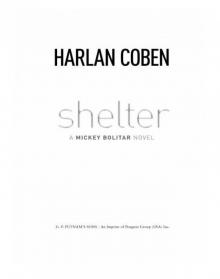 Shelter
Shelter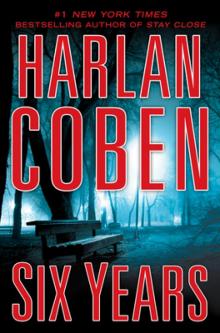 Six Years
Six Years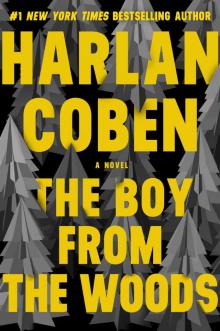 The Boy from the Woods
The Boy from the Woods Missing You
Missing You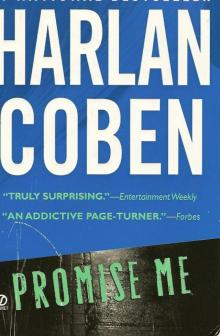 Promise Me mb-8
Promise Me mb-8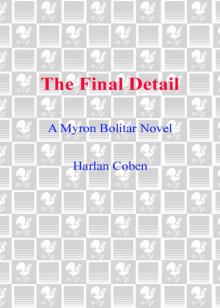 The Final Detail: A Myron Bolitar Novel
The Final Detail: A Myron Bolitar Novel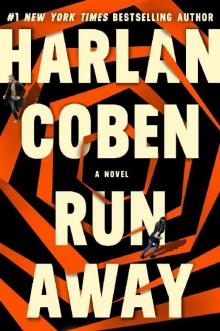 Run Away
Run Away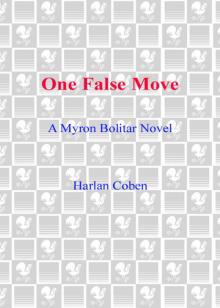 One False Move: A Myron Bolitar Novel
One False Move: A Myron Bolitar Novel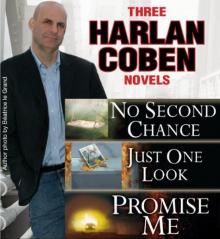 Three Harlan Coben Novels
Three Harlan Coben Novels the Woods (2007)
the Woods (2007) Tell No One (2001)
Tell No One (2001) the Innocent (2005)
the Innocent (2005)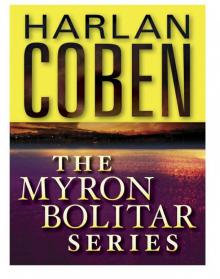 The Myron Bolitar Series 7-Book Bundle
The Myron Bolitar Series 7-Book Bundle Gone for Good (2002)
Gone for Good (2002) Caught (2010)
Caught (2010) Hold Tight (2008)
Hold Tight (2008)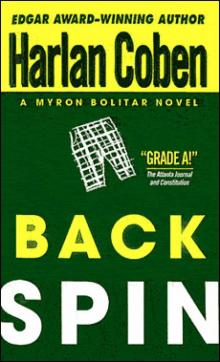 04 - Back Spin
04 - Back Spin Miracle Cure (1991)
Miracle Cure (1991) Harlan Coben 3 Novel Collection
Harlan Coben 3 Novel Collection Just One Look (2004)
Just One Look (2004)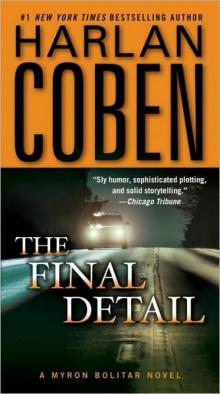 The Final Detail mb-6
The Final Detail mb-6 Play Dead (2010)
Play Dead (2010)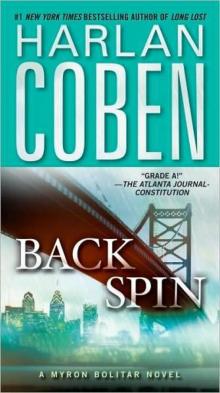 Back Spin mb-4
Back Spin mb-4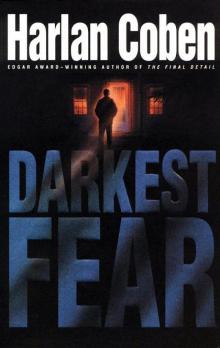 Darkest Fear mb-7
Darkest Fear mb-7